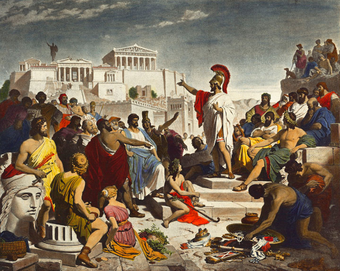"If there be one thing more than another which is true of genuine democracy, it is that genuine democracy is opposed to the rule of the mob. For genuine democracy is based fundamentally on the existence of the citizen, and the best definition of a mob is a body of a thousand men in which there is no citizen."This quotation is from G.K. Chesterton's article on Victor Hugo, the author of Les Miserables, in Pall Mall magazine of 1902. In it Chesterton puts his finger on a great dilemma. It is wise to devote much attention to the idols of our time, of which Democracy is one. Others include Capitalism, Progress (or Evolution), Wealth, and Equality. None of these means anything, or rather, each of them
means several different things and so ought to be defined carefully whenever it is used. Others, such as Peace and Justice, have become so vague that they too qualify as idols.
For Plato, a democratic society was already more than halfway down the slippery slope, from aristocracy to tyranny. But then, for him, not all members of a society could be "citizens", who formed a very exclusive club. Today, things are different. Democracy does not mean "mob rule". Or does it? The two- (or three-) party system was designed to forestall revolution by permitting alternative governments an opportunity to win power through elections at regular intervals. But when the choice is made by a numerical majority largely ignorant of the issues or even the principles at stake, increasingly manipulated by the techniques of advertising and the pressure of money, it seems that "mob rule" is often what we have in practice. In Platonic terms, we are a democracy on the way to becoming a tyranny – because the tyrant, in Chesterton's phrase, "always relied on the masses".
A genuine democracy, according to Chesterton, is only possible if it is based on the existence of genuine "citizens". A citizen is a man or woman (pace Plato and Chesterton) who counts as a full member of society, imbued with the rights and duties that signify full participation. Not all citizens, however, are necessarily competent to vote in an election or a referendum: children, prisoners, the insane, and other categories may be excluded, for example. Beyond this we start to get into difficulties. Why should stupid people, or ignorant people, or wicked people, be allowed to vote? Who do we assign to these categories, and who assigns them? That problem is insoluble.
The way to have a more intelligent election is to have a more intelligent electorate. It is not just a matter of supplying them with information (though a free press is also essential). The problem comes down to education. Without excluding anyone, we need to make sure that the largest possible proportion of the electorate are well educated. This connects once again with Plato, for although for him the group of citizens was a restricted bunch, they were supposed to be distinguished by the quality of their education – they received an education for leisure and freedom, a liberal education. It is the capacity to rise above one's feelings and what one is told by others, the ability to discern, reflect, and decide for oneself, and the love of truth, integrity, and virtue, that qualify a person to be a fully mature participant in society, a citizen in the fullest sense, rather than just an inhabitant or native.
You can't engineer a successful democracy. But you can do a great deal to improve (even to a revolutionary degree) our school system, and the way we think about education. That is where this blog points to the great work that is being done in the homeschooling movement and small liberal arts colleges (see Beauty in Education). Maybe, if we raise a few more citizens, the polis will recover with them.

"Maybe, if we raise a few more citizens, the polis will recover with them."
ReplyDeleteHow does that which does not exist recover?
The polis is by nature at human scale, where as there is virtually not a country on earth at human scale. And most are leviathans so large that even the oceans cannot contain them.
The polis can probably be larger than a man can see across, or walk across in a day, but to all things there is a limit and Aristotle was probably close to the mark regardless of modes of transportation and communication.
Adding on. Bishoprics tend to exist at modern human scale, and also are of a size to allow for some for of overall authority, so off hand I would say a Bishopric is about as large as a Polis should be.
ReplyDeleteAnd speaking of Bishoprics, let those who are Catholic be the leaven that form the society.
It seems running the world bank and running the world are interchangeable. On that basis Sir Francis Bacon made the "leaven" point rather more earthily":
ReplyDelete"Government is like muck: not good unless it be spread".
I'm sure Chesterton would agree, not that Edward Hadas ("Breaking Views" on debt) would understand.